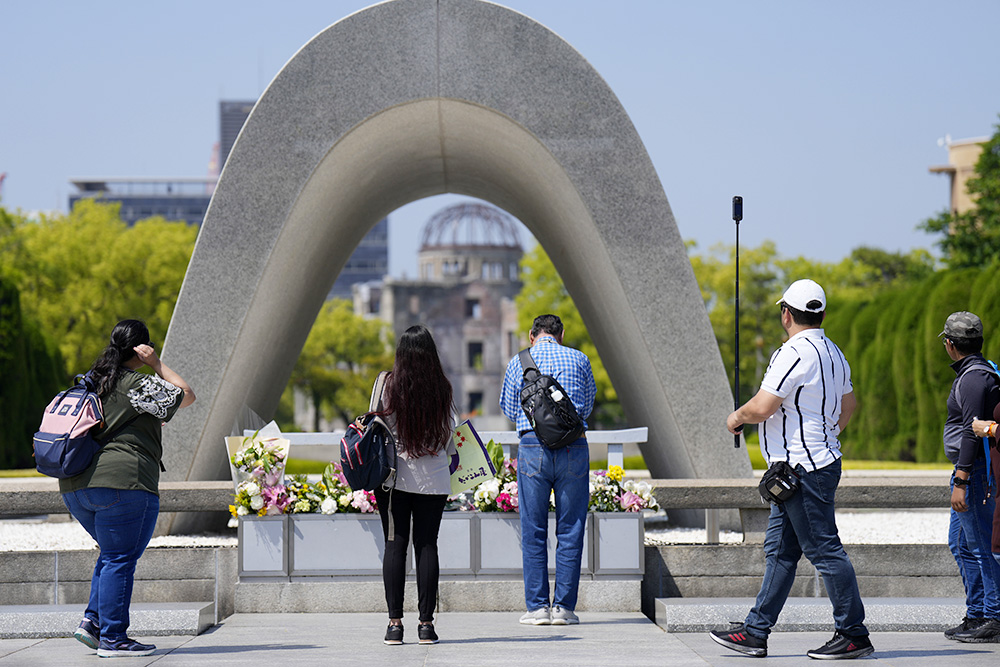
Two U.S. Catholic archbishops have joined with the Japanese bishops of Hiroshima and Nagasaki to call on leaders of seven major industrialized nations, meeting in Japan May 19-21, to « undertake concrete steps toward global, verifiable nuclear disarmament. »
In an unusual shared statement released publicly on May 17, the four Catholic leaders — representing two U.S. archdioceses involved in nuclear weapons production or deployment and, in Japan, representing the only two dioceses ever destroyed by atomic bombing — urge the G-7 summit not to view expected discussions on Russia’s war in Ukraine as a barrier to conversations about disarmament.
Instead, Nagasaki Archbishop Peter Michiaki Nakamura, Hiroshima Bishop Alexis Mitsuru Shirahama, Seattle Archbishop Paul Etienne and Archbishop John Wester of Santa Fe, New Mexico, say the Ukrainian war is « a clear demonstration of the absolute need » to discuss nuclear disarmament.
The four bishops also praise Japanese Prime Minister Fumio Kishida for choosing to host the summit in Hiroshima, which was destroyed by a U.S. atomic bomb on Aug. 6, 1945.
« That alone is a powerful message, » say the bishops. They also cheer the scheduled meeting between G-7 leaders and members of the hibakusha, or atomic bomb survivors.
Beyond the history of the Japanese bishops’ dioceses as sites of nuclear devastation, the bishops noted the significance of the U.S. archdioceses in ongoing nuclear armament. The Santa Fe area is home to the Los Alamos National Laboratory, which helped develop the first atomic bombs and continues in nuclear weapons research. The Seattle area is home to about one-third of the nation’s deployed nuclear weapons force.
Wester has addressed nuclear issues previously. In 2022, he released a pastoral letter calling for nuclear disarmament, titled: « Living in the Light of Christ’s Peace: A Conversation Toward Nuclear Disarmament. »
The four bishops outlined a list of recommendations for G-7 leaders. The G-7 countries include the United States, Japan, Germany, the United Kingdom, France, Canada and Italy.
The bishops press the leaders to engage seriously with the site of the summit, encouraging them to « acknowledge the tremendous, long-lasting human suffering the Hiroshima and Nagasaki atomic bombings inflicted upon the hibakusha, » as well as to « acknowledge the tremendous, long-lasting human suffering that production and nuclear weapons testing caused to downwinders around the world. »
The bishops also encourage the leaders to reaffirm their earlier commitments, including the statement that « a nuclear war cannot be won and must never be fought, » and the goal « of a future world free of nuclear weapons. »
The bishops also said G-7 leaders should « emphasize that, as the G-20 agreed to in November 2022, the use and the threat of use of nuclear weapons are ‘inadmissible.’ «
Beyond reckoning with history and reaffirming commitments, the bishops also recommended specific policy goals.
They urged G-7 leaders to « announce and commit to concrete steps to prevent a new arms race, guard against nuclear weapons use, and advance nuclear disarmament. »
Also on May 17, more than 200 former world leaders and defense ministers, nuclear experts and diplomats released a joint statement on the occasion of the G-7 meeting to call for increased nuclear arms control and for Russia and the U.S. to « compartmentalize » nuclear arms control.
« United States-Russia strategic stability talks are in limbo and the New START treaty, which has played an indispensable role in ensuring reciprocal security, is now in question, » they wrote.
In February, Russian President Vladimir Putin announced his country would stop participating in New START, a nuclear arms control treaty with the U.S. that limits both countries’ number of strategic nuclear missile launchers.
The former world leaders and experts said the U.S. and Russia should confirm « that they will not exceed the New START limits on deployed nuclear forces » and commit « to pursuing good faith negotiations on a successor framework for New START before its expiration in 2026. »
The U.S. and Japanese bishops’ statement made similar recommendations, saying the G-7 should « reiterate that serious talks should be restored between the United States and Russia to renew full implementation of the New Strategic Arms Reduction Treaty and to negotiate a follow-on treaty. »
In their closing recommendation, the bishops urged the G-7 to take seriously their historic commitments and « honor the international mandate to enter into serious multilateral negotiations leading to nuclear disarmament, pledged more than a half-century ago in the 1970 NonProliferation Treaty. »
Signing off, « Yours in the hopes of humanity for lasting peace on earth, » the bishops wrote, « We strongly urge world leaders at the G-7 Summit to show by example how international leadership is ready, willing, and able to work with nuclear weapons and non-nuclear weapons states to ensure no country or city ever suffers the horrors of nuclear war again. »